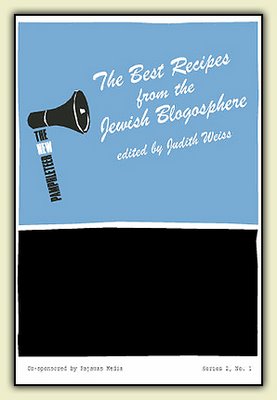Gayle Miller, who writes at And you thought YOU were cranky?, responded to a comment I had left over at sisu that made reference to our annual Chanukah tradition: Chinese take-out and potato latkes. In doing so, she posed a question that has bedeviled great minds for generations:
First, I’ll venture to say that the extreme popularity of Chinese food among Jews is primarily a phenomenon of the less observant movements. Reform Jews typically pay little, if any, attention to the dietary restrictions of kashrut; Conservative Jews, while nominally adhering to halakha (religious regulations), include among their numbers many who are not strict followers of the dietary laws. [Like me. Ahem.]
For most Orthodox Jews to eat Chinese, a kosher Chinese restaurant is required. These are thin on the ground outside of major metropolitan areas.
Having said that, what is it about Chinese food that attracts Jews?
First of all, someone else cooks it. This is especially important on Sunday evenings, when the typical hausfrau is worn out from Weekend Amusement. With Monday looming, who the hell wants to cook?
Second, Chinese food looks kosher. Sorta. Bear with me here.
Fact is, Chinese cooking (as well as other Asian cuisines, Indian food being a notable exception) eschews the use of dairy ingredients such as milk, butter, or cheese. It’s rice, vegetables, meat, and fish. So, nominally, the probihition against mixing meat and dairy is not an issue.
As for that meat and fish, sure, there’s the prohibited pork and seafood a-plenty. For that matter, none of the meat is likely to be kosher even if it comes from a kosher animal, since the appropriate ritual slaughtering techniques do not prevail amongst the Chinese. But since these ingredients are generally hocked up into little bitty pieces, it's easy enough to pretend that “it’s all beef and flounder.”
Third, the stuff just happens to be Damn Tasty. And what hungry (non-observant) Jew is gonna argue with that?
That’s my story, and I’m sticking to it.
I’ve found some support for (a few of) the above theories in a fairly scholarly piece by Jessica Carew Kraft at New Voices. Kraft additionally points out that “Chinese cuisine uses ingredients common to Eastern European food like chicken, cabbage, and celery, as well as copious amounts of garlic and onions.”
But her take on some of the sociological considerations affecting the immigrant Jews of the early 1900’s is especially revealing. Quoting sociologists Gaye Tuchman and Harry Levine, Kraft notes that
What’s funny to me is, I’ve spent a lot of time in Asia: Taiwan, Hong Kong, China, Thailand, Singapore, Indonesia, Malaysia, Japan, Korea. And on Sunday evenings, everyone orders pastrami sandwiches from the deli carry-out...
“It’s Sunday. What’s for dinner?”
“Let’s order in some Jewish.”
Hey, it could happen!
Elisson - what is it with Jewish people and Chinese takeout? I keep asking my boss but he’s Observant and hasn’t a clue?Great question, Gayle. And there is no simple answer.
First, I’ll venture to say that the extreme popularity of Chinese food among Jews is primarily a phenomenon of the less observant movements. Reform Jews typically pay little, if any, attention to the dietary restrictions of kashrut; Conservative Jews, while nominally adhering to halakha (religious regulations), include among their numbers many who are not strict followers of the dietary laws. [Like me. Ahem.]
For most Orthodox Jews to eat Chinese, a kosher Chinese restaurant is required. These are thin on the ground outside of major metropolitan areas.
Having said that, what is it about Chinese food that attracts Jews?
First of all, someone else cooks it. This is especially important on Sunday evenings, when the typical hausfrau is worn out from Weekend Amusement. With Monday looming, who the hell wants to cook?
Second, Chinese food looks kosher. Sorta. Bear with me here.
Fact is, Chinese cooking (as well as other Asian cuisines, Indian food being a notable exception) eschews the use of dairy ingredients such as milk, butter, or cheese. It’s rice, vegetables, meat, and fish. So, nominally, the probihition against mixing meat and dairy is not an issue.
As for that meat and fish, sure, there’s the prohibited pork and seafood a-plenty. For that matter, none of the meat is likely to be kosher even if it comes from a kosher animal, since the appropriate ritual slaughtering techniques do not prevail amongst the Chinese. But since these ingredients are generally hocked up into little bitty pieces, it's easy enough to pretend that “it’s all beef and flounder.”
Third, the stuff just happens to be Damn Tasty. And what hungry (non-observant) Jew is gonna argue with that?
That’s my story, and I’m sticking to it.
I’ve found some support for (a few of) the above theories in a fairly scholarly piece by Jessica Carew Kraft at New Voices. Kraft additionally points out that “Chinese cuisine uses ingredients common to Eastern European food like chicken, cabbage, and celery, as well as copious amounts of garlic and onions.”
But her take on some of the sociological considerations affecting the immigrant Jews of the early 1900’s is especially revealing. Quoting sociologists Gaye Tuchman and Harry Levine, Kraft notes that
Jews were also attracted to Chinese food because it was something different. Jewish immigrants came to see many of their own customs as antiquated and inappropriate for their new life in America. For many of them, Chinese food symbolized a cosmopolitan and sophisticated experience, and thus provided an escape from Jewish provincialism.Read the whole thing.
What’s funny to me is, I’ve spent a lot of time in Asia: Taiwan, Hong Kong, China, Thailand, Singapore, Indonesia, Malaysia, Japan, Korea. And on Sunday evenings, everyone orders pastrami sandwiches from the deli carry-out...
“It’s Sunday. What’s for dinner?”
“Let’s order in some Jewish.”
Hey, it could happen!




















No comments:
Post a Comment